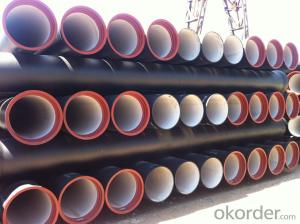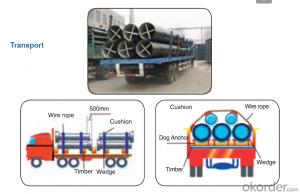Duct Iron Pipe DI Pipe ISO 2531 DN 80-2000mm K9
- Loading Port:
- Tianjin
- Payment Terms:
- TT OR LC
- Min Order Qty:
- 100 m
- Supply Capability:
- 100000 m/month
OKorder Service Pledge
OKorder Financial Service
You Might Also Like
Specification:
1. size : DN80-DN2000 available with PN16 or PN10 or PN25 flanges
2.Standard : ISO2531/EN545/EN598/AWWA standard
3. WRAS Potable Water FBE Internal Lining
4.Material : Ductile iron
5.Technical: Casting
6. Type: Socket / flange PN10 / PN16 / PN25
7. Length=6m, 5.8m
8. Coating: Fusion bonded epoxy to 300 microns Dry Film Thickness
Portland cement lining internally and zinc-rich paint with not less than 70 microns bitumen externally
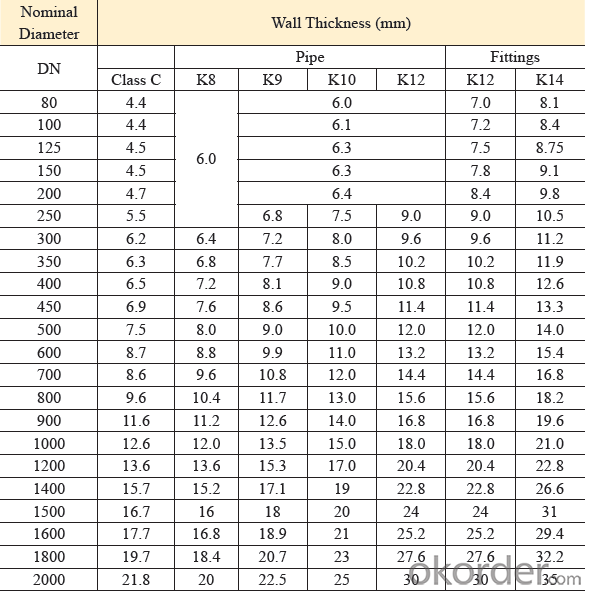
Quality:
ISO 2531 or EN 545 Standard K9 Class, K12 Class
1. ISO 9001 Certificate
2. ISO 2531 & EN 545 Certificate
3. WRAS Potable Water Certificate for FBE Internal Lining
4. WRAS EPDM Rubber Gasket or NBR Rubber Gasket
5. DN80mm - DN2000mm
6. Black Bitumen or Blue FBE / Epoxy Coating
7. Lengh = 6m or cut into 5.6m, 5.7m, 5.8m
8. Client's Brand Customization Allowable
9. Container or Bulk Loading / Shipping
10.Delivery within one Month or According to Client's Order Quantity
11. Support Client or The Third Party Inspection before Shipment
Standard Lining and Coating:
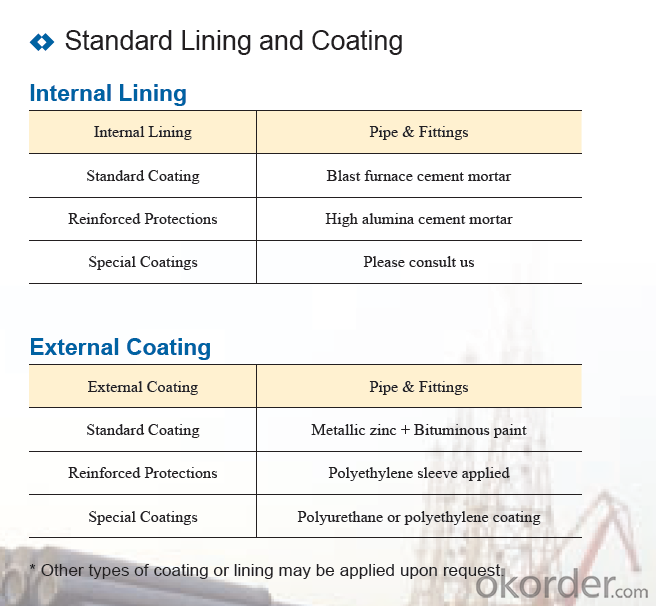
Transport:
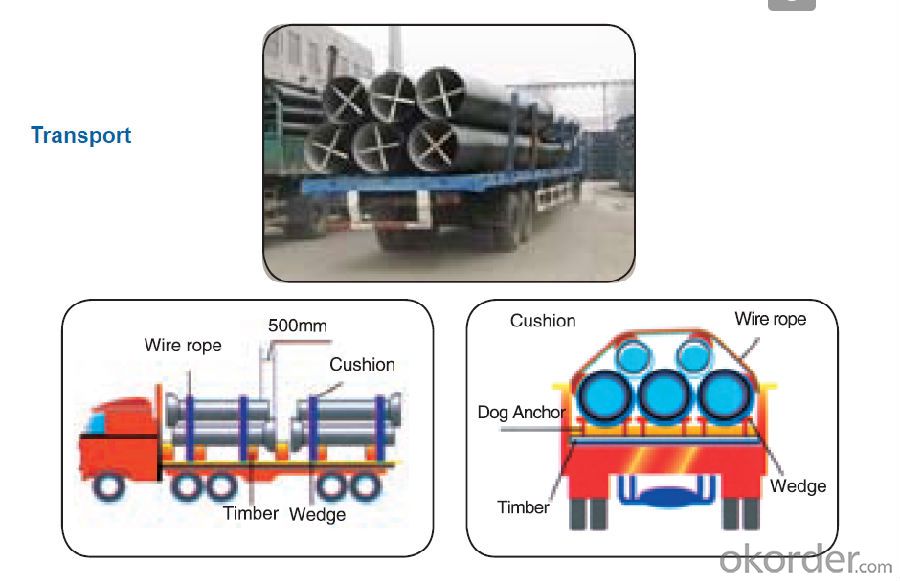
- Q:What are the different lining materials available for ductile iron pipe?
- There are several different lining materials available for ductile iron pipes. These linings are used to protect the pipe from corrosion and extend its lifespan. Some common lining materials include: 1. Cement Mortar Lining: This lining consists of a layer of cement mortar applied to the interior surface of the pipe. It provides a smooth and durable barrier against corrosion and is commonly used in water and wastewater applications. 2. Polyethylene Encasement: Polyethylene encasement involves wrapping the pipe with a layer of polyethylene film. This lining provides excellent corrosion protection and is often used in aggressive soil conditions. 3. Polyurethane Lining: Polyurethane lining is a spray-applied material that forms a seamless and flexible barrier inside the pipe. It offers superior resistance to chemicals and abrasion, making it suitable for applications involving aggressive fluids. 4. Epoxy Lining: Epoxy lining is a popular choice for lining ductile iron pipes, as it provides excellent resistance to corrosion and chemicals. It is typically applied as a liquid coating that cures to form a smooth and protective layer. 5. Zinc Coating: Zinc coating, also known as galvanizing, involves applying a layer of zinc to the exterior surface of the pipe. This lining provides corrosion resistance and is commonly used in outdoor and exposed applications. These lining materials offer different advantages and are chosen based on the specific needs of the application. Factors such as the type of fluid being transported, environmental conditions, and expected service life are considered when selecting the most suitable lining material for ductile iron pipes.
- Q:Are ductile iron pipes suitable for use in saltwater environments?
- Yes, ductile iron pipes are suitable for use in saltwater environments. Ductile iron is highly resistant to corrosion and can withstand the corrosive effects of saltwater, making it a reliable choice for piping systems in such environments.
- Q:Can ductile iron pipes be used for water distribution networks?
- Water distribution networks can utilize ductile iron pipes. Ductile iron, a type of cast iron known for its strength and flexibility, is well-suited for a variety of applications, including water distribution systems. Due to their durability, resistance to corrosion, and long lifespan, ductile iron pipes have been widely used in water supply networks. These pipes are capable of withstanding high pressure and are resistant to external loads and ground movement, making them an ideal choice for underground installations. Additionally, ductile iron pipes are commonly used for transporting safe drinking water as they are non-toxic and do not contaminate the water supply. Moreover, ductile iron pipes possess excellent hydraulic properties, ensuring efficient water flow and minimizing friction losses. Their smooth interior surface prevents the accumulation of deposits, reducing the risk of clogs and maintaining a consistent water flow. In summary, ductile iron pipes offer a reliable and effective solution for water distribution networks, guaranteeing the safe and efficient transportation of water to communities and industries.
- Q:Can ductile iron pipes be used for irrigation systems in agricultural fields?
- Ductile iron pipes are indeed suitable for use in agricultural fields for irrigation systems. Their durability, strength, and corrosion resistance are well-known, making them an excellent choice for a variety of applications, including irrigation systems. These pipes can withstand high pressures and effectively transport water for irrigation purposes. Moreover, the ductile iron material is resistant to various environmental factors like UV rays, soil chemicals, and temperature changes, ensuring that the pipes have a long lifespan. Additionally, ductile iron pipes exhibit excellent flow characteristics, enabling efficient water distribution across the agricultural fields. In summary, ductile iron pipes offer a reliable and sturdy option for irrigation systems in agricultural fields, delivering a sustainable and efficient solution for water distribution.
- Q:How are ductile iron pipes protected against erosion caused by high-velocity flow?
- Ductile iron pipes are protected against erosion caused by high-velocity flow through various methods. One common approach is to apply an internal lining to the pipe, which can be made of materials such as cement mortar or polyethylene. This lining provides a smooth surface that reduces the friction and turbulence of the flowing water, thus minimizing the erosion potential. Additionally, external coatings, such as bitumen or epoxy, can be applied to protect the outer surface of the pipe from erosion caused by external factors like soil movement or abrasive materials. Regular inspection and maintenance of the pipes also play a crucial role in identifying and addressing any erosion-related issues to ensure their long-term durability.
- Q:How much is the installation cost of the ductile iron tube?
- Water supply pipe is the first choice, with high cost performance. Compared with the PE pipe, from the installation time, ductile pipe PE pipe installation is simple and rapid, and after the installation of internal and external pressure bearing better tightness and corrosion resistance; from the point of view, ductile pipe sealing better after installation, but also can improve the corrosion resistance through various anti-corrosion methods;
- Q:Can ductile iron pipes be used in contaminated soil conditions?
- Yes, ductile iron pipes can be used in contaminated soil conditions. Ductile iron is known for its strength and durability, making it resistant to corrosion and damage from external factors such as soil contaminants. Additionally, ductile iron pipes have been successfully used in a variety of challenging environments, including contaminated soils, where they can provide reliable and long-lasting underground infrastructure for the transportation of water and other fluids.
- Q:How does ductile iron pipe perform in corrosive soils?
- Ductile iron pipe performs exceptionally well in corrosive soils due to its inherent corrosion resistance properties. The pipe is made from a unique composition of iron, carbon, and other elements that enhance its durability and resistance to corrosion. One of the key features of ductile iron pipe is its protective lining. The interior of the pipe is lined with either cement mortar or a special epoxy coating, which acts as a barrier between the corrosive soil and the pipe itself. This lining protects the iron from coming into direct contact with the soil, preventing corrosion. Additionally, ductile iron pipe has a higher resistance to external corrosion when compared to other materials like steel. It can withstand the chemical reactions caused by acidic or alkaline soils and remains unaffected by the corrosive elements present in the ground. This makes it an ideal choice for installation in areas with highly corrosive soils. Furthermore, ductile iron pipe has a long service life, further contributing to its performance in corrosive soils. The durable nature of the pipe and its resistance to corrosion ensure that it can withstand the challenges posed by corrosive soils for several decades without significant degradation. In conclusion, ductile iron pipe excels in corrosive soils due to its protective lining, resistance to external corrosion, and long service life. Its ability to withstand the harsh conditions presented by corrosive soils makes it a reliable and durable choice for various applications, including water distribution, sewage systems, and industrial pipelines.
- Q:How long is the service life of the cast iron pipe, and the time of use of ductile iron pipes?
- Ductile iron is a new type of pipe, as long as we use it properly, the quality of its products, then the use of ductile iron pipes for 20-35 years, basically no problem. But whether it is ductile cast iron pipe, or some other things, the use of more years, and more or less, there will be some problems, ductile iron pipe can not escape the robbery. However, as long as we use the ductile iron pipe in the process of careful care, the service life of the problem is not to worry about.
- Q:How do ductile iron pipes compare to PVC pipes in terms of strength?
- PVC pipes are generally considered to be less strong than ductile iron pipes. Ductile iron, a type of cast iron, is strengthened and made more flexible through the addition of small amounts of magnesium. This treatment enhances its resistance to cracking and breaking under pressure, making it suitable for various applications including water and wastewater transportation. In contrast, PVC pipes are made from a plastic known as polyvinyl chloride. While PVC pipes are relatively durable, they do not possess the same level of strength as ductile iron pipes. They are more susceptible to cracking and breaking when subjected to high pressure or extreme temperature changes. PVC pipes are commonly utilized in low-pressure systems such as irrigation and drainage. In terms of strength, ductile iron pipes exhibit greater tensile strength and can endure higher internal and external pressures compared to PVC pipes. Additionally, ductile iron pipes have a higher resistance to impacts, reducing the likelihood of damage from external forces like heavy machinery or accidental impacts. However, it is important to consider specific project requirements when choosing between ductile iron and PVC pipes. Factors such as cost, ease of installation, corrosion resistance, and the nature of the fluid being transported should all be taken into account.
1. Manufacturer Overview |
|
|---|---|
| Location | |
| Year Established | |
| Annual Output Value | |
| Main Markets | |
| Company Certifications | |
2. Manufacturer Certificates |
|
|---|---|
| a) Certification Name | |
| Range | |
| Reference | |
| Validity Period | |
3. Manufacturer Capability |
|
|---|---|
| a)Trade Capacity | |
| Nearest Port | |
| Export Percentage | |
| No.of Employees in Trade Department | |
| Language Spoken: | |
| b)Factory Information | |
| Factory Size: | |
| No. of Production Lines | |
| Contract Manufacturing | |
| Product Price Range | |
Send your message to us
Duct Iron Pipe DI Pipe ISO 2531 DN 80-2000mm K9
- Loading Port:
- Tianjin
- Payment Terms:
- TT OR LC
- Min Order Qty:
- 100 m
- Supply Capability:
- 100000 m/month
OKorder Service Pledge
OKorder Financial Service
Similar products
New products
Hot products
Related keywords
